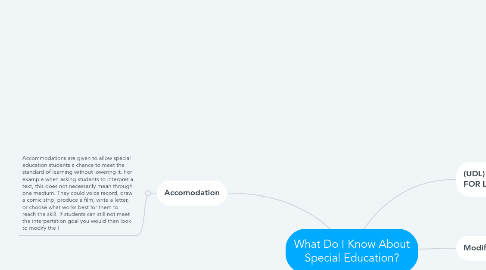What Do I Know About Special Education?
von Casandra Hein


1. Accomodation
1.1. Accommodations are given to allow special education students a chance to meet the standard of learning without lowering it. For example when asking students to interpret a text, this does not necessarily mean through one medium. They could voice record, draw a comic strip, produce a film, write a letter, or choose what works best for them to reach the skill. If students can still not meet the interpertation goal you would then look to modify the l
2. Autism
2.1. Umbrella term for a wide range of sensory, social, behavioral, and communicative conditions
2.1.1. Autism Spectrum
2.1.2. Aspergers
2.1.3. Atypical
3. Physical Disabilities
3.1. Hearing Loss
3.2. Poor Vision
3.3. Imobility
3.4. Brain Injury
3.5. Chronic Health Disorders
4. (UDL) UNIVERSAL DESIGN FOR LEARNING
4.1. Engagement
4.2. Reppresentation
4.3. Expression
5. Modification
5.1. This requires lowering the standard of learning for the student to best fit their needs and should be done after every accommodation has been given. For example, instead of asking a student to interpret a text in their journal, I could ask them to simply recall the text.
6. IDEA
6.1. Legislation ensuring students with a disability are provided with Free Appropriate Public Education. That education should be tailored to their individual needs.
6.2. In order to qualify a student must (a) have a documented disability and (b) require special access to education in order to meet the base curriculum
7. Psychological Disabilities
7.1. Mood Disorders
7.1.1. Students suffering from anxiety, depression or PTSD, bi-polar disorder or self harm.
7.2. Behavioral Disorders
7.2.1. This could be a variety of issues including hyperactivity, defiant behavior, or inattention
7.2.1.1. ADHD
7.2.1.2. ODD (Oppositional Defiant Disorder)
7.3. Learning Disabled
7.3.1. This is an issues with information processing wether it be with reading, writing, length of attention, memory, sequencing, organization etc.
7.3.1.1. Dyscalculia
7.3.1.2. Dyslexia

